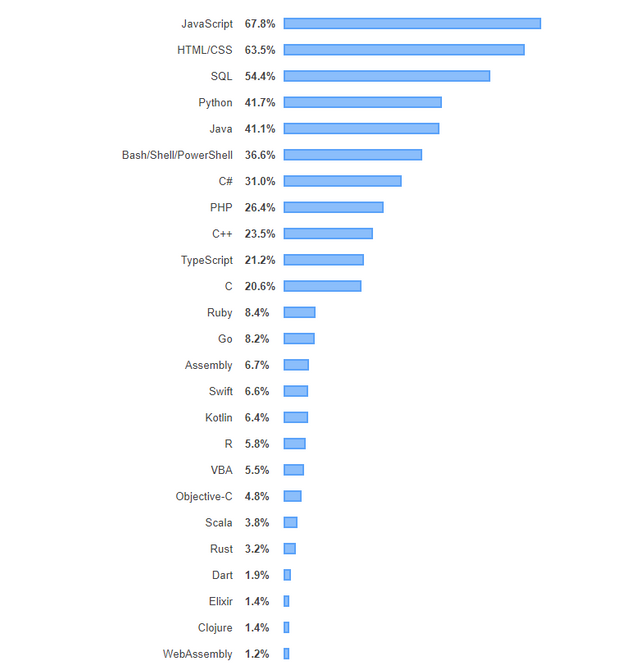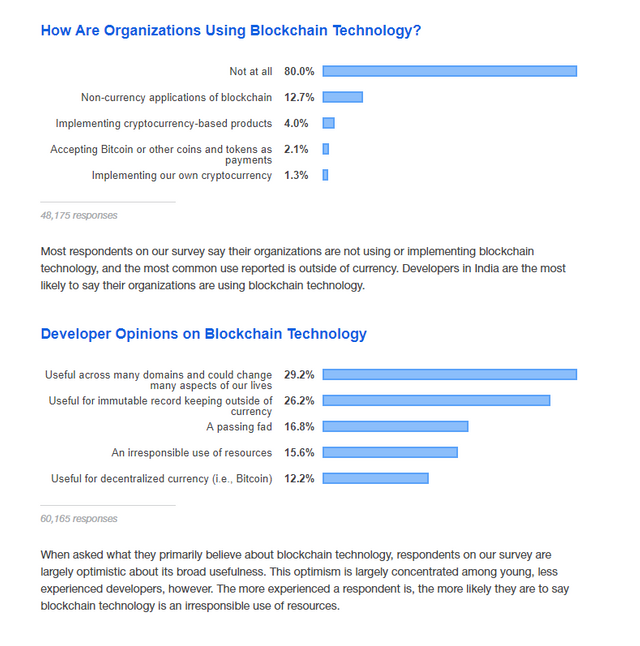Interested how developers learn and level up and which tools they are using? Check out the Developers Survey Results 2019.

This year is already the ninth year that Stack Overflow has published the results. This time, almost 90,000 developers took the survey. Most of them are full-stack developers, but there were also designers, students, data specialists and mobile developers. They all took the time to tell us how they learn and level up, which tools they are using and what they want for the future.
Directly from the survey:
Stack Overflow’s annual Developer Survey is the largest and most comprehensive survey of people who code around the world. Each year, we field a survey covering everything from developers’ favorite technologies to their job preferences.
Despite our survey’s broad reach and capacity for informing valuable conclusions, we acknowledge that our results don’t represent everyone in the developer community evenly. We have further work to do to make Stack Overflow the welcoming, inclusive, and diverse platform we want it to be, and this is reflected in our survey sample.

Some interesting results
Most popular technologies
Not really a surprise, but JavaScript is the most used and most popular programming language. However, that may change soon. Python has risen sharply again. It is by far the fastest growing major programming language. In 2013, Python was used by 21.9% of developers who responded to the survey. Last year, that was already 38.8%.
Developers use Python for development, DevOps, data analysis and machine learning. The latter two in particular are gaining popularity.
Some advantages of the Python programming language:
- Python is a programming language that is fully open source.
- Thanks to the clear and easy-to-understand syntax of Python, it has become one of the world's most user-friendly programming languages. It is used worldwide in numerous projects ranging from small-scale programs for Raspberry PI to huge projects at NASA and Google.
- Perhaps the strongest element of Python is the vastly expanded Standard Library that allows you to program faster and more effectively for a wide variety of projects. This standard material can thoroughly simplify many complex coding tasks, making your codebase much more streamlined.
Blockchain in the real world
As you can see, in 80% of the cases blockchain technology isn't used in the organizations of the respondents. This confirms what we all know: no matter how familiar the word blockchain may sound to some, the technology is still in its infancy (and it is just not always useful).
Much more interesting is their opinion about blockchain technology. Here we see that the more experienced a respondent is, the more likely they are to say blockchain technology is an irresponsible use of resources.
Are the more experienced developers just not ready for this new (r)evolution? Or do young programmers often overestimate the applicability of new, exciting technology. Hard to say. As always, the truth is somewhere between the two extremes...

The least you can say, however, is that today we are already see some changes, apart from a few people who became millionaires overnight, others who lost their homes and a few Ferraris who got new owners. Blockchain initiatives have been used for almost all sectors that you can think of - from finance and security to entertainment, media and even porn. Some concrete examples:
- Finance: no getting around Ripple here. The Enterprise blockchain solution for global payments has already assured itself of a few large financial partnerships.
- Land registry: The allocation of ownership of a piece of land is still a low-tech process in most countries. To reduce irregularities and counterfeits and increase transparency, Sweden started experimenting with blockchain to set up land registers. The country started experimenting in June 2016, and so far it has successfully completed various stages of experimentation. It is expected that the blockchain land registration system will be up and running this year.
- Supply chain management: Maersk, the world's largest shipping company, has already deployed blockchain technology from IBM to track containers. In addition, Walmart uses the same technology to track the journey of around 1,100,000 items, from the manufacturer to the store.
- Healthcare: in the United States, there is the example of Gem. The project was launched as a means of giving patients control over their medical records and DNA data, Gem has now partnered with the US Center for Disease Control and Prevention to use blockchain to control infectious diseases.
In addition to the fact that blockchain technology is still in its infancy and therefore appears less reliable, the timing of the survey is also important. It came after the hype. It is important that we acknowledge that after the hype, the boom and the relative bust (in terms of market value), we will soon see more and more signals of real, meaningful change and positive value, due to blockchain implementation and adoption. In other words: the examples mentioned above are just the very beginning.
Beyond the world of fintech, numerous start-ups are building applications to make use of blockchain in health care and supply chain management. There is also a wide range of examples of blockchain in insurance, advertising, autonomous vehicles and transport, Internet of Things, clean energy, content creation and distribution, and much more. Oh yes, blockchain is here to stay!
Interested in all the results of the survey? You can find it here.




This post is supported by @tipU upvote :)
@tipU voting service: instant upvotes + free profit sharing tokens | For investors.